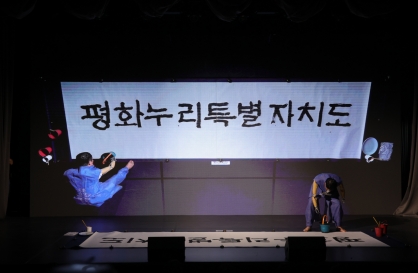N.K. adopts decision to elect its leader as ruling party's chairman
By KH디지털2Published : May 10, 2016 - 09:38
North Korea has adopted a decision to elect its leader Kim Jong-un as the chairman of the ruling Workers' Party of Korea (WPK), the North's state media said Tuesday, a move aimed at bolstering the leader's tight control on power.
The Korean Central News Agency (KCNA) said that the North's leader was elected to the "top post" of the ruling party -- chairman of the WPK -- at the first party congress in 36 years, which concluded its four-day run Monday.
The country revised its party rules, which stipulate that its top post is "chairman of the WPK and he is its supreme leader who represents the party and leads the whole party."
Kim has been at the top post of the ruling party, but his previous title was the first secretary of the WPK. He also serves as the first chairman of the National Defense Commission and the supreme commander of the Korean People's Army.
The seventh party congress served as a venue to reaffirm Kim's dual pursuit of nuclear and economic development, and to highlight the role of the WPK as the paramount political body in the North.
The current leader's late father Kim Jong-il advocated a military first, or "songun," policy, highlighting the role of the military, but the young leader has shifted his focus to the WPK while simultaneously pursuing nuclear and economic development.
At the party gathering, Kim has made it clear that he will "permanently" defend the pursuit of his signature policy of developing nuclear weapons in tandem with boosting the country's moribund economy, commonly known as the "byeongjin" policy.
The party congress has decided to enshrine the leader's policy of simultaneously pursuing nuclear and economic development in its revised party rules, according to the Rodong Sinmun, the country's main newspaper.
The North's leader conducted a reshuffle of top party officials but not in a drastic manner, experts said.
The KCNA said that at a plenary meeting, the WPK's central committee elected five members to the standing committee of the party's politburo, including the North's leader.
The four other members are ceremonial leader Kim Yong-nam; Hwang Pyong-so, director of the general political bureau of North Korea's armed forces; premier of the Cabinet Pak Pong-ju; and Choe Ryong-hae, a party secretary.
The party's central committee also elected 19 members and nine alternate members of the party's political bureau, according to the KCNA.
North Korean Foreign Minister Ri Su-yong was named as one of the 19 Politburo members. Kim Yo-jong, the younger sister of the North's leader, was not mentioned on the list, but she became one of the party's 129 central committee members.
The committee also decided to set up a new political affairs bureau named "the Executive Policy Bureau," which will be led by the North's leader.
"The latest reshuffle did not involve a dramatic generational change," said Cheong Seong-chang, a senior researcher at the Sejong Institute. "It means that the North's leader has consolidated his power in a stable manner."
Experts said that it is noteworthy that Choe Ryong-hae has been tapped as a member of the standing committee of the party's politburo, an indication that he has become a key aide to the North's leader.
Choe served as a standing member of the political bureau in 2014 and 2015, which effectively made him the third-highest ranking person in the communist country at the time.
But he is believed to have lost favor and received re-education at a rural farm late last year as punishment for his mishandling of a newly built hydroelectric power plant project.
At the latest shakeup of party elites, Choe has also become a vice chairman of the newly created bureau of political affairs.
"Choe has returned as one of the closest aides to the North's leader," said Yang Moo-jin, a professor at the University of North Korean Studies. "He is now seen as the No. 2 man in the party."
North Korean top diplomat Ri's ascent to a politburo member was also noteworthy due to a possibility that he may have replaced Kang Sok-ju, a secretary handling international relations at the party, analysts said. Kang is known to be in poor health.
Ri is believed to have served as a guardian of North Korean leader Kim Jong-un when Kim studied at an international school in Switzerland in the 1990s.
Meanwhile, the North's military official Ri Yong-gil was found on the list of alternate members of the party's political bureau, trumping rumors that he might have been executed.
South Korea's spy agency said in February that Army Gen. Ri, a former chief of the General Staff of the Korean People's Army, was executed on corruption and other charges, and replaced by Ri Myong-su, a former minister of people's security.
The sudden disappearance of North Korean officials is usually viewed by outside analysts as being linked to a possible purge or punishment.
Since taking power, the North's leader has executed around 100 party and military officials to take a firmer grip on power, according to South Korea's Institute for National Security Strategy. (Yonhap)





![[Graphic News] Number of coffee franchises in S. Korea rises 13%](http://res.heraldm.com/phpwas/restmb_idxmake.php?idx=644&simg=/content/image/2024/05/02/20240502050817_0.gif&u=)




![[Robert J. Fouser] AI changes rationale for learning languages](http://res.heraldm.com/phpwas/restmb_idxmake.php?idx=644&simg=/content/image/2024/05/02/20240502050811_0.jpg&u=)
![[Today’s K-pop] Stray Kids go gold in US with ‘Maniac’](http://res.heraldm.com/phpwas/restmb_idxmake.php?idx=644&simg=/content/image/2024/05/02/20240502050771_0.jpg&u=)





![[Eye Interview] 'If you live to 100, you might as well be happy,' says 88-year-old bestselling essayist](http://res.heraldm.com/phpwas/restmb_idxmake.php?idx=652&simg=/content/image/2024/05/03/20240503050674_0.jpg&u=)
